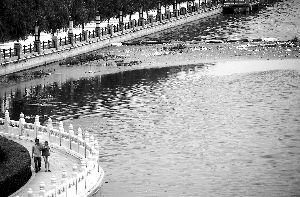Beijing to invest 16.2 billion yuan to renovate North Canal
2009-07-28 16:29 BJT
From 2009 to 2015, Beijing will invest 16.2 billion yuan to manage the North Canal over seven years. At the 12th conference of the 13th Standing Committee of the People’s Congress of Beijing Municipality held on the morning of July 26, Xia Zhanyi, Deputy Mayor of Beijing Municipality, reported the development of the proposal “to promote the management of the North Canal, and to prevent and treat polluted water resources,” and proposed that sewage treatment facilities at the center of Beijing and new towns should be upgraded and reformed, so that treated water meets class-IV surface water standards, two levels higher than current water quality.
 |
| On July 26, in Tongzhou, Duckweed and garbage float on the water at the junction of the North Canal and the Tonghui River. Beijing will invest 16.2 billion yuan over seven years to manage the North Canal. |
The North Canal will be managed over seven years
At the 2nd conference of the 13th Standing Committee of the People’s Congress of Beijing Municipality in early 2009, five delegations and 83 representatives put forward ten proposals on the management of the North Canal basin and the treatment of polluted water.
Speaking about the proposals, Xia Zhanyi said that the “North Canal Basin Management Plan (2009-2015)” has been completed and approved by Beijing Municipal Government. Under the plan, Beijing will divide the North Canal basin into 226 parts to treat polluted water. Management of the North Canal will be phased in over seven years starting in 2009 for completion in 2015. Total investment in the project will be 16.2 billion yuan.
Xia Zhanyi said that by 2012, first and second grade tributaries in the North Canal valley “will not be black, smelly and full of algae.” No garbage will be dumped within 1 kilometer of the river basin, and water usage will rise to 56 percent. The anti-pollution control mechanism will be initially established in North Canal valley. By 2015, water usage in this river basin will increase to 70 percent.
City center to upgrade nine sewage treatment plants
In addition, Beijing will speed up the construction of sewage treatment facilities to promote the recycling of wastewater. Nine sewage treatment plants in the city center will all be upgraded to allow the treatment of sewage to reach Class-IV surface water standards. In Beijing’s new towns, another 21 renewable water plants will be constructed or upgraded to promote the new sewage treatment techniques and improve water quality to reach Class-IV surface water standards.
Some members of the Standing Committee of the People’s Congress said that after reaching these goals, sewage water will no longer be washed away and will instead become a precious resource. Class-IV surface water can be used in rivers and urban scenic spots, significantly saving water resources.
Translated by LOTO
Editor: Shi Taoyang | Source: CCTV.com
 Mail
Mail Share
Share Print
Print


 Video
Video









 2009 China Central Television. All Rights Reserved
2009 China Central Television. All Rights Reserved